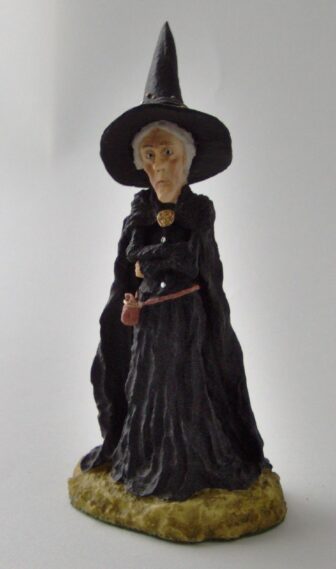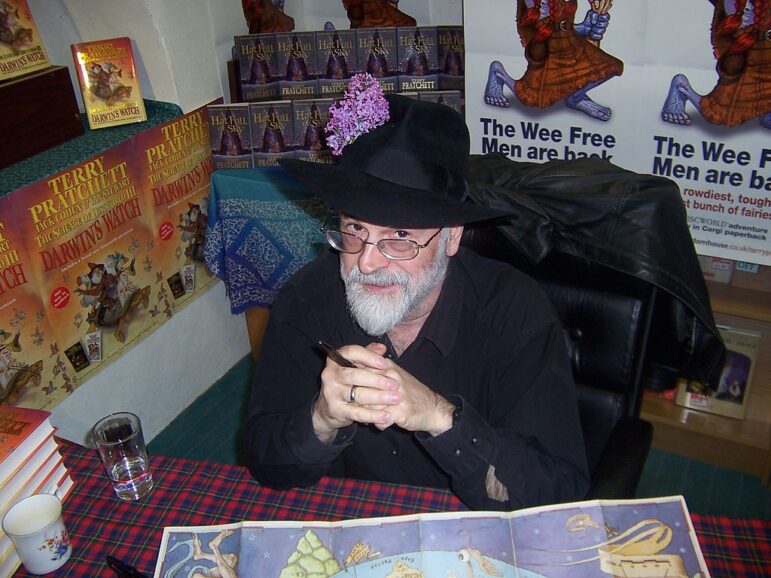
If there’s one ancestor I’d like to claim, it’s Esme Weatherwax.
I didn’t learn that she had died until years after the fact. Or rather, I did know in a way – I knew that there would be no more stories. I started to ration them, allowing myself a book at intervals, when I heard about Sir Terry’s illness, and then spacing them out further at the news of his death. It felt like mourning each time I picked up a new Discworld novel, excited to see my friends again and aware that the list of books I hadn’t yet read was growing, for the first time in my life, measurably smaller.
It shouldn’t have surprised me when Granny Weatherwax died. She was one of the oldest characters in the books, a stalwart from before Pratchett had truly found his pace, one of the pillars of the world he had built. His diagnosis was clear, and early enough for him to prepare. I might have expected that his last book would be about death, about handing over a legacy, about someone leaving exactly the way they wanted to. I had mourned Terry Pratchett for years – but I wasn’t ready for Granny to die.
She was exactly the sort of elder that I so often struggle to get along with – set in her ways, unarguable, a ramrod of a woman. She was the pillar of the community and yet apart from it, and there was no sign in any of her books that she was happy- but she was content, invested, determined to see that everything was alright in her corner of the world. Her corner of the world extended exactly as far as she decided it should and might, on occasion, come back around to overlap itself again.
I don’t tend to cry, while reading, but she was the witch who taught me the most important lesson I know about magic. Reading her death felt like losing family.

Figure from a Ukrainian boardgame [jimd2007, Wikimedia Commons, CC 2.0]
My ancestor practice is an odd thing, out of stride with the ideas I have about what it should look like. The most vibrant part of it is what I consider my Ancestors of Path – the people whose lives have created a world where I can live, whose stories inspire me and push me towards the best version of myself, or who I’m simply very fond of.
They’re an odd bunch – a court entertainer, an architect, a copper salesman – but they are all, to the best of my knowledge, dead humans. Even though I’ve erred away from my own bloodlines, I have tended to keep my ancestor practice firmly grounded in people that I am at least mostly sure have lived and died in the past.
Anyone else – and that definition has gotten wider as I have gotten older – has been classed as another kind of spirit. I have often hailed my ancestors as a group, but other spirits have either gotten individual attention and devotion or been told, regretfully, that I simply don’t have enough space in my life for another altar.
Pop culture spirits have entered my life relatively recently, and my practice is still in flux as I try to figure out how to incorporate them. The thought of claiming a fictional character as part of my lineage makes me feel childish, a kid caught up in their own imagination. I worry what other people will think – or worse, that I’ll unknowingly insult someone whose ancestor practice is rooted in research and the yellowed pages of the census.
The idea keeps presenting itself, though. Missing Granny feels very different from missing her author. Both have left holes in my understanding of the world, but those holes are different shapes, and saying that I am simply mourning Sir Terry, and moved by his own eulogy, rings false.
But of course it would. There are any number of quotes from Terry Pratchett’s books that moved me and shaped the way I thought of the world. But the one I always come back to, the one that shaped my magical practice – that was Granny Weatherwax. “Sin, young man, is when you treat people as things. Including yourself. That’s what sin is.” She was talking outside of the Christian context, talking about the heart of where bad things start. It hit me at a time when I, newly out of the church, was trying to understand what “bad” and “good” even meant, and it changed my entire paradigm.
Writing off Granny Weatherwax would be treating her as a thing – not a person. I could never.

Terry Pratchett in 2005 [Myrmi, Wikimedia Commons, CC 2.0]
I’m old enough now, and long enough on this path, to be able to look back and see a little of the shape of how I have changed. Sometimes I imagine that I can pinpoint the moment I hit this idea, the moment I read Carpe Jugulum and it rippled out into my practice.
When I talk about it out of context, I usually rephrase it a little. Luke’s Number One Rule of Spirit Work: Assume that you’re talking to a person, and treat them like a person. This doesn’t mean being nice to everyone, necessarily – but it does challenge me towards empathy and animism, and reminds me of my responsibility for my impact.
It also opens the door to being surprised by my relationships and allows them to change and grow. Thinking about the gods as people who can have their feelings hurt makes me consider how I’m behaving towards them, and whether I’m acting in a way I’m proud of. Thinking about my house as a person helps me to tend it better, to be kinder toward it and more careful of its needs.
With enough practice, as with all magic, it starts to color the world around it. I am kinder to myself, and more tolerant of my own mistakes, because my body is not just a thing to be used. I am more considerate and attentive to my partners when I am engaging with them as people, not just performing the tasks that would satisfy their conditions for pleasantness.
I don’t think about sin, or talk about it using that word. It’s not particularly useful, to me, and it carries too much of the guilt and blame that froze me as a child. I phrase it as a question, instead. Am I treating someone as a statistic, a commodity, a thing to be dealt with, owned, or used? Is there a way that I can reframe to treat them as a person, instead – to understand their motivations, engage on their own terms, and connect as one person to another?
I don’t always answer them well – but they’re questions that have helped me to be a better version of myself, and I owe them to tall, rangy old woman in a very large hat.
GNU Sir Terry Pratchett – and hail, Granny Weatherwax. I hope I’m half the witch you were.
The Wild Hunt is not responsible for links to external content.
To join a conversation on this post:
Visit our The Wild Hunt subreddit! Point your favorite browser to https://www.reddit.com/r/The_Wild_Hunt_News/, then click “JOIN”. Make sure to click the bell, too, to be notified of new articles posted to our subreddit.